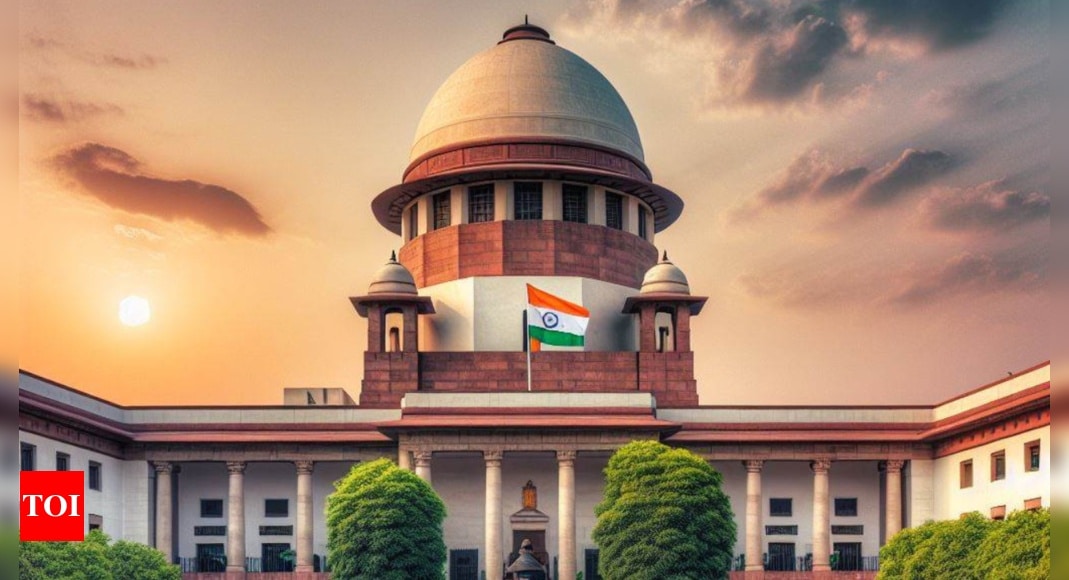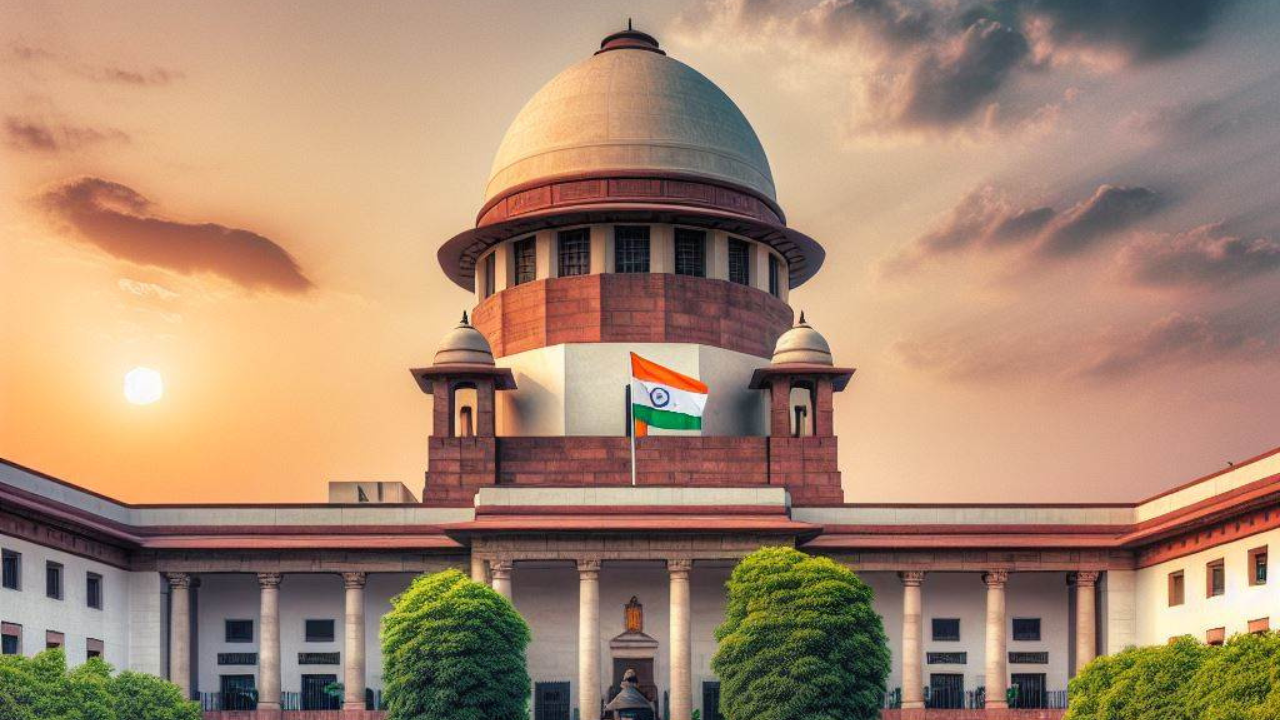
[ad_1]
NEW DELHI: Supreme Court on Monday declined to interfere with a Varanasi court’s order allowing a priest nominated by the Kashi Vishwanath Temple Trust to conduct daily puja at ‘Vyas Ji Ka Tehkhana‘ inside Gyanvapi mosque’s cellar and said Muslims would continue to offer namaz as usual inside the mosque.After a one-and-a-half-hour-long hearing on the plea of Gyanvapi mosque management committee, a bench of CJI D Y Chandrachud and Justices J B Pardiwala and Manoj Misra said since carrying out puja and other rituals by Hindus in the cellar did not interfere with the offering of namaz by Muslims, “status quo as obtained at present shall be maintained till final decision”.To Anjuman Intezamia Masjid management committee’s objection to the puja, SC said allowing puja had not resulted in obstructions for namaz.
Final hearing on Muslim side plea in July 3rd wk
For the Anjuman Intezamia Masjid (Gyanvapi mosque) management committee, senior advocate Huzefa Ahmadi, with advocate Mohd Nizamuddin Pasha, argued that first, the discovery of a purported ‘shivling’ in the wuzukhana had led to sealing of the area and, now, the tehkhana was being allowed to be worshipped by Hindus. “This is akin to Hindus slowly chipping away the mosque and is nothing but encroaching on the land which is a wakf property,” Ahmadi said.
Drawing a parallel with the fate of Babri Masjid in Ayodhya, Ahmadi said despite an undertaking by the highest executive of the state before SC, the structure could not be protected and was demolished. “… Allowing puja inside the mosque’s cellar will result in discord and will lead to disturbances. Why would they need this cellar when there is a huge temple adjacent to it and when both communities have offered prayers peacefully for centuries?” he asked.
However the bench said allowing puja had not resulted in obstructions for namaz.
“At this stage, bearing in mind that namaz by Muslim community continued unhindered after Jan 17 and 31 orders (of the trial court) and the offering of puja and worship by Hindu priest is confined to the area of tehkhana, it would be appropriate to maintain status quo as of today so as to enable both the communities to offer religious worship in the above terms,” it said, adding that status quo would not be altered by any party without prior leave of SC.
The CJI-led bench said religious observances by Hindus shall be in terms of the order dated Jan 31 of the trial court, subject to the custody of the receiver. This means only the priest would carry out puja and related rituals and the public would not be allowed to enter the cellar.
While asking the Hindu side to respond by April 30 to the mosque management committee’s appeal against Allahabad HC decision, which upheld the trial court’s Jan 17 and 31 orders, appointing a receiver for the tehkhana and allowing puja, the bench posted the final hearing on the Muslim side’s appeal in the third week of July.
For the Hindu side, senior advocate Shyam Divan and advocate Vishnu Shankar Jain said only priests nominated by the temple trust were permitted to do puja by entering the cellar from the southern side, which is distinct from the north-side entry for Muslims to offer namaz in the mosque. They said the court’s suggestion not to expand the worship area was acceptable to the Hindu side.
Ahmadi said for 30 years, access of Hindus to the mosque was barred and suddenly the trial court judge, on his last day in office prior to retirement on Jan 31, allowed worship inside the mosque, which historians believe to have been constructed over the razed structure of the original Kashi Vishwanath temple. But Divan argued that till 1993, the tehkhana was in possession of Hindus.
Ahmadi said, “Within hours of the trial court order of Jan 31, UP govt acted in haste, cut open the iron grill to create access to the cellar and on the same day the worship commenced. It effectively presented a fait accompli and stubbed out Muslim side’s right to appeal. In which case has the state acted with such alacrity to implement a trial court order within hours?”
Final hearing on Muslim side plea in July 3rd wk
For the Anjuman Intezamia Masjid (Gyanvapi mosque) management committee, senior advocate Huzefa Ahmadi, with advocate Mohd Nizamuddin Pasha, argued that first, the discovery of a purported ‘shivling’ in the wuzukhana had led to sealing of the area and, now, the tehkhana was being allowed to be worshipped by Hindus. “This is akin to Hindus slowly chipping away the mosque and is nothing but encroaching on the land which is a wakf property,” Ahmadi said.
Drawing a parallel with the fate of Babri Masjid in Ayodhya, Ahmadi said despite an undertaking by the highest executive of the state before SC, the structure could not be protected and was demolished. “… Allowing puja inside the mosque’s cellar will result in discord and will lead to disturbances. Why would they need this cellar when there is a huge temple adjacent to it and when both communities have offered prayers peacefully for centuries?” he asked.
However the bench said allowing puja had not resulted in obstructions for namaz.
“At this stage, bearing in mind that namaz by Muslim community continued unhindered after Jan 17 and 31 orders (of the trial court) and the offering of puja and worship by Hindu priest is confined to the area of tehkhana, it would be appropriate to maintain status quo as of today so as to enable both the communities to offer religious worship in the above terms,” it said, adding that status quo would not be altered by any party without prior leave of SC.
The CJI-led bench said religious observances by Hindus shall be in terms of the order dated Jan 31 of the trial court, subject to the custody of the receiver. This means only the priest would carry out puja and related rituals and the public would not be allowed to enter the cellar.
While asking the Hindu side to respond by April 30 to the mosque management committee’s appeal against Allahabad HC decision, which upheld the trial court’s Jan 17 and 31 orders, appointing a receiver for the tehkhana and allowing puja, the bench posted the final hearing on the Muslim side’s appeal in the third week of July.
For the Hindu side, senior advocate Shyam Divan and advocate Vishnu Shankar Jain said only priests nominated by the temple trust were permitted to do puja by entering the cellar from the southern side, which is distinct from the north-side entry for Muslims to offer namaz in the mosque. They said the court’s suggestion not to expand the worship area was acceptable to the Hindu side.
Ahmadi said for 30 years, access of Hindus to the mosque was barred and suddenly the trial court judge, on his last day in office prior to retirement on Jan 31, allowed worship inside the mosque, which historians believe to have been constructed over the razed structure of the original Kashi Vishwanath temple. But Divan argued that till 1993, the tehkhana was in possession of Hindus.
Ahmadi said, “Within hours of the trial court order of Jan 31, UP govt acted in haste, cut open the iron grill to create access to the cellar and on the same day the worship commenced. It effectively presented a fait accompli and stubbed out Muslim side’s right to appeal. In which case has the state acted with such alacrity to implement a trial court order within hours?”
[ad_2]
Source link








